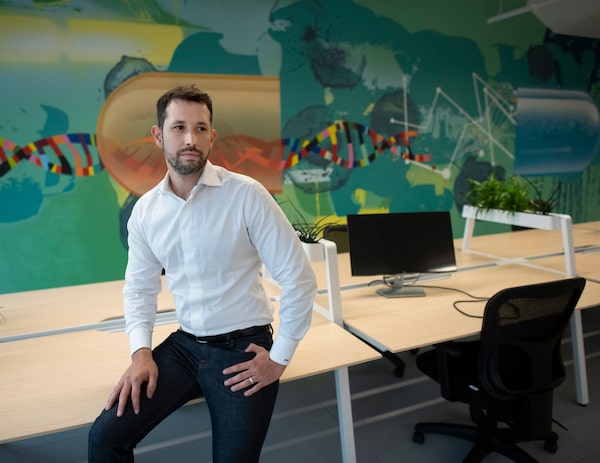
BenchSci CEO Liran Belanzon is photographed at the company’s Toronto offices on July 27, 2021. The AI company says nearly 50,000 scientists now use its platform at more than 4,450 institutions across the globe.Fred Lum/The Globe and Mail
After using machine learning to simplify how scientists find the right chemical compounds for preclinical biomedical research, Toronto’s BenchSci Analytics Inc. has raised US$50-million from investors as it expands its platform to make science research faster and cheaper.
Since its founding in 2015, BenchSci has been trying to pare back the error from trial-and-error, using artificial intelligence techniques to sort through biomedical literature so researchers can learn what’s worked before. This can save both money and time – sometimes months, when it came to figuring out which antibodies to use in drug-discovery experiments, which was the company’s first frontier.
BenchSci had fewer than two dozen employees just four years ago when AI powerhouse Alphabet Inc. noticed its work on antibody research and joined an early US$8-million financing round. By 2020, the company was expanding its search capabilities to a wider group of chemical compounds and announced another US$22-million in funding.
That mission has continued to expand to help scientists “leverage the history of science to make better decisions” in an ever-broadening sense, BenchSci chief executive officer Liran Belenzon said in an interview. He wants to help researchers learn from past experiments to hone hypotheses, experimental designs, quality-control decisions and chemical choices, and even help them better understand the results of their own work.
The company now has more than 200 staff who have spent the pandemic widening the BenchSci platform’s capabilities to try to achieve this. And the company plans to double that head count over the next year to improve its product, thanks to the new equity round led by Montreal-headquartered Inovia Capital and the U.S. private-equity firm TCV alongside past investors.
“BenchSci’s mission is to bring novel medicines to patients 50 per cent faster, and everything that they do is focused on that ambition,” said Matt Brennan, a general partner at TCV based in New York.
The company says nearly 50,000 scientists now use its platform at more than 4,450 institutions across the globe. By equipping scientists with information about what has – and hasn’t – worked in previous experiments, Mr. Brennan said he believes BenchSci could save hundreds of millions of dollars of waste from drug discovery research alone.
Many experiments fail because the wrong materials were used. In drug discovery, antibodies are one of those key materials. BenchSci’s chief scientist and initial founder, Tom Leung, first came up with the company idea while conducting cancer research, worried that picking the wrong antibody would compromise the samples he used. He soon recruited AI and data experts David Q. Chen and Elvis Wianda as co-founders, and later, through the University of Toronto’s Creative Destruction Lab, brought in Mr. Belenzon as another co-founder.
Immune systems form different kinds of antibodies to fend off pesky foreign substances, and commercial versions have been developed in order to study the effectiveness of drugs, particularly in preclinical settings. Focusing on this one set of compounds in BenchSci’s early days allowed the team to focus on a narrow, but crucial, segment of scientific literature as it developed its technology.
Now BenchSci’s focus keeps getting broader. Mr. Belenzon said his team has tried to build trust with science communities by bringing scientists themselves into the design process. He added that the science team has recently quadrupled, and is working alongside BenchSci’s engineers, including machine-learning and image-recognition specialists that scan journal text and diagrams, to ensure the platform works the way scientists do.
“This is not just an engineering problem or a science problem,” he said. “It’s multidisciplinary.”
Inovia has invested in BenchSci’s three most recent financing rounds. Partner Dennis Kavelman said he was impressed by Mr. Belenzon and his team for tackling an enormous challenge in a “measured” way. “We think we could really make this a platform and cross over all sorts of areas in preclinical [research],” he said. “It’s audacious. But wow, I think you could really have an impact on the industry.”
Your time is valuable. Have the Top Business Headlines newsletter conveniently delivered to your inbox in the morning or evening. Sign up today.
 Josh O’Kane
Josh O’Kane